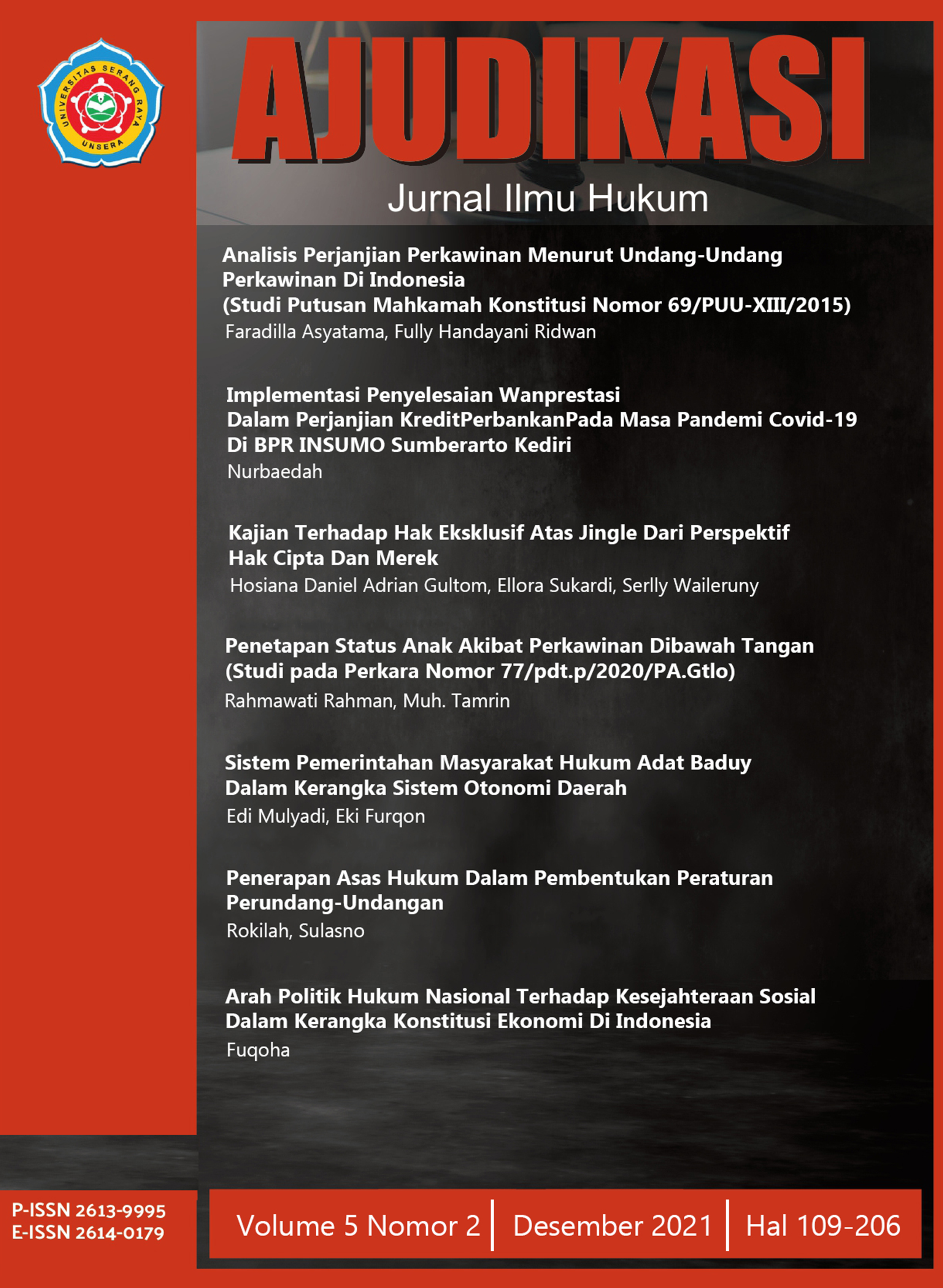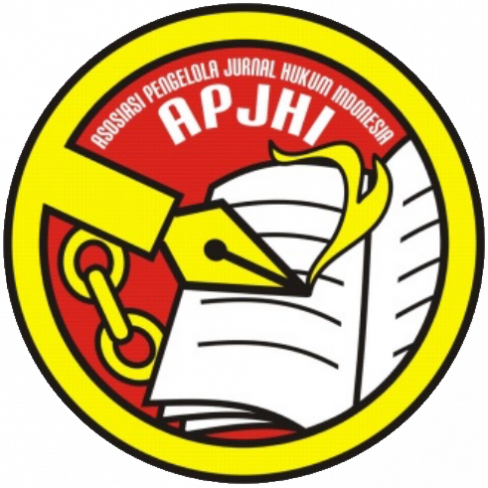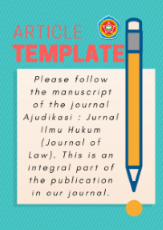Penetapan Status Anak Akibat Perkawinan Dibawah Tangan
(Studi pada Perkara Nomor 77/pdt.p/2020/PA.Gtlo)
DOI:
https://doi.org/10.30656/ajudikasi.v5i2.3714Keywords:
determination, marriage under the hands, childAbstract
The purpose of this study is to find out the legal position of the status of children born due to marriage under the hands and to find out the legal considerations of the judges of the Gorontalo Religious Court in the determination of Number. 77 / pdt.p / 2020 / PA. Gtlo. The author in his research uses normative research methods conducted by researching directly in cases that occur during society. Research is focused on describing legal issues, analyzing legal products, then presenting them systematically. The results of this study show that: 1) The legal position of the status of children born due to marriage under the hands in case Number. 77/Pdt.p/2020/PA. Gtlo, the panel of judges argued that the marriage of the petitioners was following the terms and pillars of marriage according to Islamic law, it's just that the marriage did not meet the administrative requirements as desired by article 2 paragraph (2) of Law Number: 1 of 1974 jo Law No. 16 of 2019 on marriage, so that according to Islamic law the marriage is still considered valid. Thus causing legal consequences, such as the rights and obligations of the husband and wife, marital property, the relationship between both parents and children (nasab), obligations of child maintenance (hadhanah), and inheritance. (2) Legal considerations used by the judges of the Gorontalo Religious Court in determining the petitioners' application in this case number 77 / Pdt.P / 2020 / PA. Gtlo there are at least three references of judges, namely, the evidence submitted by the applicants, the testimony of witnesses, and the provisions of the law (law) relating to the silverware.
Downloads
References
Edyar, Busman. “Status Anak Luar Nikah Menurut Hukum Positif Dan Hukum Islam Pasca Keluarnya Putusan MK Tentang Uji Materiil Undang Undang Perkawinan.†Al-Istinbath : Jurnal Hukum IslamJurnal Hukum Islam 1, no. 2 (2016): 181–208. http://journal.iaincurup.ac.id/index.php/alistinbath/article/view/115.
Fajar, Mukti, and Yulianto Achmad. Dualisme Penelitian Hukum Empiris Dan Normatif. Pustaka Pelajar, 2010.
Hamsy, Alfian Mustaghfiri. “ANALISIS YURIDIS PENETAPAN PENGADILAN AGAMA PASURUAN NOMOR : 191/PDT.P/2017/PA.PAS TENTANG STATUS ANAK LUAR NIKAH.†Jurnal Negara Dan Keadilan 7 (2018): 46–55.
Harpani, Matnuh. “Perkawinan Dibawah Tangan Dan Akibat Hukumnya Menurut Hukum Perkawinan Nasional.†Jurnal Pendidikan Kewarganegaraan 6, no. 11 (2016): 899–908.
JOGLOABANG. “UU 16 Tahun 2019 Tentang Perubahan Atas UU 1 Tahun 1974 Tentang Perkawinan | Jogloabang.†https://www.jogloabang.com/. Accessed August 30, 2021. https://www.jogloabang.com/pustaka/uu-16-2019-perubahan-uu-1-1974-perkawinan.
Purwaningsih, Prihantini. “STATUS ANAK YANG DILAHIRKAN DARI PERKAWINAN DI BAWAH TANGAN MENURUT HUKUM POSITIF INDONESIA.†Jurnal YUSTISI 3, no. 2 (2016).
UNDANG-UNDANG
Kitab Undang-Undang Hukum Perdata (KUH Perdata).
Undang-Undang No. 1 Tahun 1974jo Undang-Undang No. 16 Tahun 2019 Tentang perkawinan.
Undang-Undang No. 7 Tahun 1989 Tentang Peradilan Agama.
Peraturan Pemerintah No.9 Tahun 1975 Tentang Pelaksanaan Undang-Undang No.1 Tahun 1974 Tentang Perkawinan.
Kompilasi Hukum Islam (KHI).
Downloads
Published
Issue
Section
License
Authors who publish with this journal agree to the following terms:
Authors retain copyright and grant the journal right of first publication with the work simultaneously licensed under a Creative Commons Attribution License that allows others to share the work with an acknowledgment of the work's authorship and initial publication in this journal.
Authors can enter into separate, additional contractual arrangements for the non-exclusive distribution of the journal's published version of the work (e.g., post it to an institutional repository or publish it in a book) with an acknowledgment of its initial publication in this journal.
Authors are permitted and encouraged to post their work online (e.g., in institutional repositories or on their website) before and during the submission process, as it can lead to productive exchanges and earlier and greater citation of published work.
All articles in Ajudikasi : Jurnal Ilmu Hukum can be disseminated provided they include the identity of the article and the source of the article (Ajudikasi : Jurnal Ilmu Hukum). The publisher is not responsible for the contents of the article. The content of the article is the sole responsibility of the author
Ajudikasi : Jurnal Ilmu Hukum is lincensed under a Creative Commons Attribution-ShareAlike 4.0 International License.










1.png)
.png)
.png)





.png)
.png)
.png)
.png)





.png)







